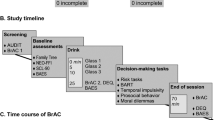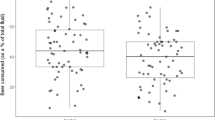Abstract
Rationale
Many studies have reported the long-term adverse effects of alcohol on executive cognitive function in chronic alcohol abusers, yet little research has investigated the acute effects of alcohol in social drinkers. Studies on acute effects report alcohol-induced deficits on tasks that require executive cognitive processes, with alcohol acting to increase preservative errors and reduce planning.
Aim
The present investigation examines the acute effects of a moderate dose of alcohol on a decision-making task that involves participants making a forced choice between two simultaneously presented binary-outcome gambles.
Methods
Alcohol (0.6 g/kg) or placebo was administered to 32 social drinkers. Participants completed the task, making a total of 80 decisions about gambles that varied in the magnitude of expected gains, losses and the probability with which these outcomes were delivered. Participants also chose between gambles probing identified non-normative biases in human decision making, namely, risk aversion for choosing between gains and risk seeking for choosing between losses.
Results
All participants picked the experimental gamble more frequently when the probability of winning was high vs low, when the gains were large vs small and when the losses were small vs large; the alcohol group had an impaired ability to factor in the magnitude of gains and the likelihood of winning when the losses were large. Deliberation time did not differ between the groups.
Conclusion
These data suggest that alcohol given acutely impairs risky decision making. In particular, alcohol impairs one's ability to alter responding in light of changing prospective rewards in order to make favourable decisions.


Similar content being viewed by others
References
Acton GS (2003) Measurement of impulsivity in a hierarchical model of personality traits: implications for substance use. Subst Use Misuse 38:67–83
Barkley RA (1997) Behavioral inhibition, sustained attention, and executive functions: constructing a unifying theory of ADHD. Psychol Bull 121:65–94
Bechara A, Damasio H (2002) Decision-making and addiction (part I): impaired activation of somatic states in substance dependent individuals when pondering decisions with negative future consequences. Neuropsychologia 40:1675–1689
Bechara A, Tranel D, Damasio H, Damasio AR (1996) Failure to respond autonomically to anticipated future outcomes following damage to prefrontal cortex. Cereb Cortex 6:215–225
Brunfaut E, Vanoverberghe V, d'Ydewalle G (2000) Prospective remembering of Korsakoffs and alcoholics as a function of the prospective-memory and on-going tasks. Neuropsychologia 38:975–984
Cairns E, Cammock T (1978) Development of a more reliable version of the Matching Familiar Figures Test. Dev Psychol 13:555–560
Cloninger CR (1994) Temperament and personality. Curr Opin Neurobiol 4:266–273
Cloninger CR, Sigvardsson S, Bohman M (1988) Childhood personality predicts alcohol abuse in young adults. Alcohol Clin Exp Res 12:494–505
Duka T, Tasker R, Stephens DN (1998) Alcohol choice and outcome expectancies in social drinkers. Behav Pharmacol 9:643–653
Evenden JL (1999) Varieties of impulsivity. Psychopharmacology (Berl) 146(4):348–361
Finn PR, Justus A, Mazas C, Steinmetz JE (1999) Working memory, executive processes and the effects of alcohol on Go/No-Go learning: testing a model of behavioral regulation and impulsivity. Psychopharmacology (Berl) 146:465–472
Fromme K, Stroot E, Kaplan D (1993) Comprehensive effects of alcohol: development and psychometric assessment of a new expectancy questionnaire. Psychol Assess:19–26
Giancola PR (2000) Executive functioning: a conceptual framework for alcohol-related aggression. Exp Clin Psychopharmacol 8:576–597
Giancola PR (2004) Executive functioning and alcohol-related aggression. J Abnorm Psychol 113:541–555
Goodwin DW, Othmer E, Halikas JA, Freemon F (1970) Loss of short term memory as a predictor of the alcoholic “blackout”. Nature 227:201–202
Grant S, Contoreggi C, London ED (2000) Drug abusers show impaired performance in a laboratory test of decision making. Neuropsychologia 38:1180–1187
Joyce EM, Robbins TW (1991) Frontal lobe function in Korsakoff and non-Korsakoff alcoholics: planning and spatial working memory. Neuropsychologia 29:709–723
Kagan J (1965) The matching familiar figures test. Harvard University Press, Cambridge, MA
Kahneman D, Tversky A (1979) Prospect theory: an analysis of decision-making. Econometica 47:263–291
Kimberg D, D'Esposito M, Farah M (1997) Cognitive functions in the prefrontal cortex—working memory and executive control. Curr Dir Psychol Sci 6:185–192
Lyvers MF, Maltzman I (1991) Selective effects of alcohol on Wisconsin Card Sorting Test performance. Br J Addict 86:399–407
Mazas CA, Finn PR, Steinmetz JE (2000) Decision-making biases, antisocial personality, and early-onset alcoholism. Alcohol Clin Exp Res 24:1036–1040
McNair D, Lorr M, Droppleman L (1971) Profile of Mood States, manual. Educational and Industrial Testing Service, San Diego
Mehrabian A, Russell JA (1978) A questionnaire measure of habitual alcohol use. Psychol Rep 43:803–806
Messer S, Brodzinsky D (1981) Three year stability of reflection-impulsivity in young adolescents. Dev Psychol 17:848–850
Minocha A, Barth JT, Roberson DG, Herold DA, Spyker DA (1985) Impairment of cognitive and psychomotor function by ethanol in social drinkers. Vet Hum Toxicol 27:533–536
Nelson H (1982) The National Adult Reading Test: test manual. NFER-Nelson, Windsor, UK
Nichols JM, Martin F (1996) The effect of heavy social drinking on recall and event-related potentials. J Stud Alcohol 57:125–135
Parsons OA, Stevens L (1986) Previous alcohol intake and residual cognitive deficits in detoxified alcoholics and animals. Alcohol Alcohol 21:137–157
Petry NM, Bickel WK, Arnett M (1998) Shortened time horizons and insensitivity to future consequences in heroin addicts. Addiction 93:729–738
Rahman S, Sahakia J, Cardinal N, Rogers R, Robbins T (2001) Decision making and neuropsychiatry. Trends Cogn Sci 5:271–277
Rey A (1964) L'examen clinque en psychologie. Universitaires de France, Paris, France
Rogers RD, Tunbridge EM, Bhagwagar Z, Drevets WC, Sahakian BJ, Carter CS (2003) Tryptophan depletion alters the decision-making of healthy volunteers through altered processing of reward cues. Neuropsychopharmacology 28:153–162
Rogers RD, Lancaster M, Wakeley J, Bhagwagar Z (2004) Effects of beta-adrenoceptor blockade on components of human decision-making. Psychopharmacology (Berl) 172:157–164
Salkind N, Wright J (1977) The development of reflection-impulsivity and cognitive efficiency: an integrated model. Hum Dev 20:377–387
Scarna SA, McTavish SFB, Cowen PJ, Goodwin GM, Rogers RD (in press) The effects of a branched chain amino acid mixture supplemented with tryptophan on biochemical indices of neurotransmitter function and decision-making. Psychopharmacology
Shallice T (1982) Specific impairments of planning. Philos Trans R Soc Lond B Biol Sci 298:199–209
Steele CM, Josephs RA (1990) Alcohol myopia. Its prized and dangerous effects. Am Psychol 45:921–933
Steele CM, Southwick L (1985) Alcohol and social behavior I: the psychology of drunken excess. J Pers Soc Psychol 48:18–34
Tarter RE, Schneider DU (1976) Blackouts: relationship with memory capacity and alcoholism history. Arch Gen Psychiatry 33:1492–1496
Weissenborn R, Duka T (2000) State-dependent effects of alcohol on explicit memory: the role of semantic associations. Psychopharmacology (Berl) 149:98–106
Weissenborn R, Duka T (2003) Acute alcohol effects on cognitive function in social drinkers: their relationship to drinking habits. Psychopharmacology (Berl) 165:306–312
Author information
Authors and Affiliations
Corresponding author
Rights and permissions
About this article
Cite this article
George, S., Rogers, R.D. & Duka, T. The acute effect of alcohol on decision making in social drinkers. Psychopharmacology 182, 160–169 (2005). https://doi.org/10.1007/s00213-005-0057-9
Received:
Accepted:
Published:
Issue Date:
DOI: https://doi.org/10.1007/s00213-005-0057-9




